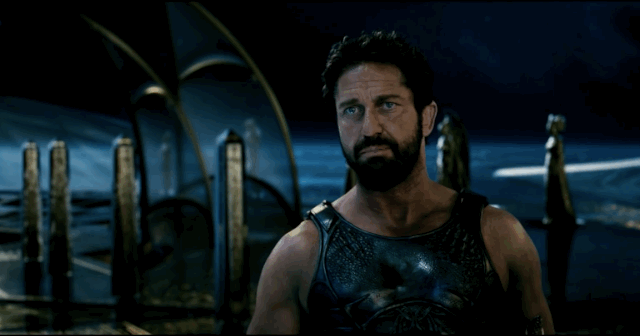Go ahead, commit cannibalism! Slaughter your neighbours and feast on their still-warm flesh. Nobody can judge you, because the mere existence of the film Gods of Egypt has dissolved all social contracts, and eliminated forever all concepts of good and evil.
The moment I walked out of a screening of Gods of Egypt, I set about building a massive throne out of human pelvises. I worked feverishly through the night, barely pausing to listen to the sounds of the city fracturing into seven brutal revels: a chainsaw maze, a great pit full of vengeful lobsters, a poisoned rave and so on. As I climbed at last atop my pelvic majesty, I had a perfect view of the inundation of viscera that had turned the very streets into canals: For even if nobody else ever saw this movie, its very existence was enough to sunder every human relation for once and ever. There could be no language, no society, no kindness, after Gods of Egypt.
How did this happen? Why didn’t somebody involved with the creation of Gods of Egypt realise what they were setting in motion, and that this movie was not just bad, but obscenely, devastatingly bad? I wondered this the whole time I was watching Gods of Egypt.
I’m going to give you a spoiler warning here, even though spoilers are a concept that belongs to the old order, before the rise of the murderpocalypse.
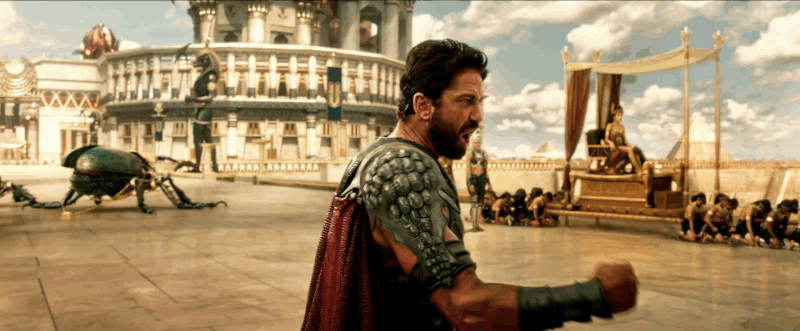
So Gods of Egypt is loosely based on Egyptian mythology, if the Egyptian gods were mostly white people who could turn into animal robots, sort of like Transformers. Basically, director Alex Proyas and his crew tried to turn the ancient beliefs of the Egyptians into a standard action-adventure movie, full of wacky set pieces and wild romps. And they wound up something that actually makes a river of entrails seem totally reasonable.
This movie starts when the god Horus (Nikolaj Coster-Waldau from Game of Thrones) is about to be crowned King of Egypt — until his uncle, the evil god Set (Gerard Butler), overthrows him. To get back his power and reclaim the throne, Horus must work with a plucky human thief named Bek (Brenton Thwaites) to pass a bunch of tests, with a little help from the sun god, Ra (Geoffrey Rush). So yeah, it’s a buddy comedy about a god and a mortal teaming up to save the world and stuff — which could actually have been good, in theory.
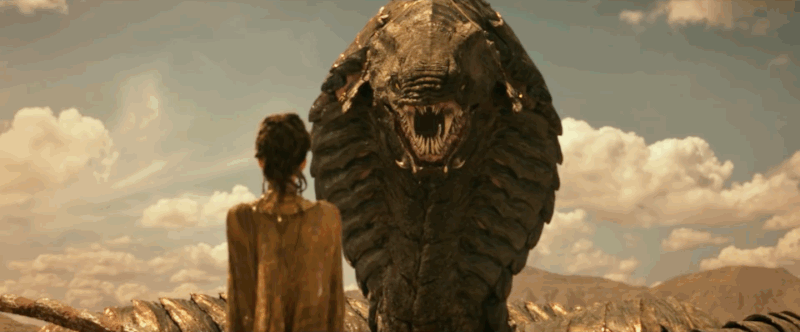
In fact, in theory, this movie could have been awesome — generally any film with giant fire-breathing snakes, huge scarab-drawn chariots and holy spaceships is automatically great, in my book. But instead, Gods of Egypt squanders all of its incredible potential.
Gods of Egypt has been justly criticised for its policy of casting white people as almost all of its Egyptian characters — to the point where it might be the first movie whose director apologised months before it was released. But the casting is just one of the many problems that eat away at this movie, which seems to have fed slices of Egyptian cultural traditions into a typical Hollywood “Save the Cat Goddess” structure, to try and create something familiar and comfort-foody, with an exotic veneer.
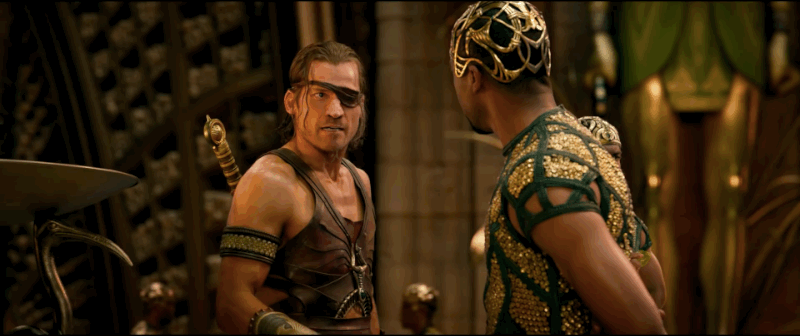
The result is a movie in which nothing particularly makes sense. The stakes are completely unclear, and the moment that you think you have a handle on what’s going on, the movie lurches off in another direction. The actors stand around in front of greenscreens, saying terrible dialogue that they know is meaningless, and none of it carries any weight at all. This is also the umpteenth movie I’ve seen lately that has 90 minutes of action padded out to over two hours.
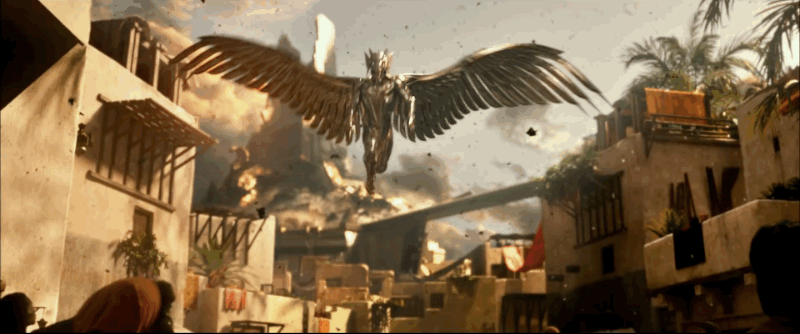
Bek, the movie’s ostensible main character, is supposed to be desperately in love with a mortal woman named Zaya (Courtney Eaton) who dies early on — so Bek is helping Horus in the hope that the god-king can bring Zaya back from the afterlife. But Zaya’s death puts barely a dent in Bek’s chipper action hero banter, and he just carries on leaping from CG obstacle to CG obstacle, while saying things like, “roll the bones!”
Meanwhile, every few minutes, the movie asks us to care about stakes-raising weird ideas like, “Set has changed the rules of the afterlife!” and “Set has stolen the glowing blue brain of the only black person in the movie!” At the same time, you don’t get the impression that any of the human characters actually worships these gods or considers them more than just oversized people with random powers.

But the result of taking all this grand metaphysical weirdness and putting it into a formulaic action-movie template is to create a movie where nothing means anything, but the film keeps dragging you from set piece to set piece every few minutes anyway. This isn’t just a film where it’s impossible to care, but one that negates the very idea of giving a shit.
Nothing has meaning! Everything is monstrous.
And that brings us to the central problem of Gods of Egypt — this movie can’t manage to find an interesting tone. At all. It’s either a comedy, in which there’s exactly one funny line of dialogue, or it’s a breezy action-adventure romp in which the characters are unlikable and the plot is mush, or it’s a semi-serious epic about the struggle of the gods. The overwhelming tone is one of blandness, like a rejected Disney Channel TV movie starring the brother from Hannah Montana and one of the less gifted wizards of Waverly Place.
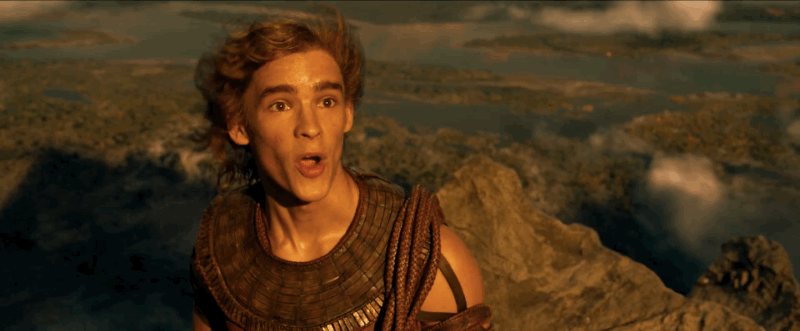
And meanwhile, this movie’s aesthetic is a weird mixture of Egyptology pastiche and VFX overkill. As I mentioned, the Egyptian gods are sort of like off-label Transformers. Their fights, for the most part, look pretty awfully rendered, with a lot of bits that look like ’90s video games. And the film’s aesthetic is pretty much a solid gold — all the buildings are gold, the gods are blinged out, and they bleed gold blood.
And one of the film’s most interesting visual innovations turns out to be its greatest liability: all of the gods, including Jaime Lannister, are much bigger than ordinary humans. Like, maybe 3 or 3.6m tall, I’m guessing. This yields a few startling shots early on in the film, but also means that at no point can the actors just be in a scene together, without everything being rendered digitally. I have a feeling that’s one reason for the utter lack of chemistry or personality in any of this movie’s character-building moments.
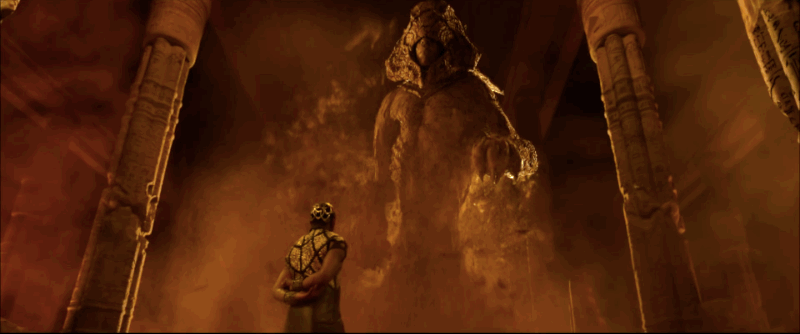
This movie feels like a dull, joyless monument to excess and cultural exploitation.
I’m just going to repeat the word “joyless” a few more times — joyless, joyless, joyless — while reminding you that I’m writing this review on a computer keyboard that I fashioned out of the fingernails and ribs of my former best friends. (The keyboard’s not connected to anything; I’m not even sure how you’re reading this, to be honest.) I love an over-the-top bad movie as much as the next Joe Bob Briggs acolyte, but Gods of Egypt is just too damn bland — even with Gerard Butler shouting his heart out in a few scenes — to be anything but brain-compacting.
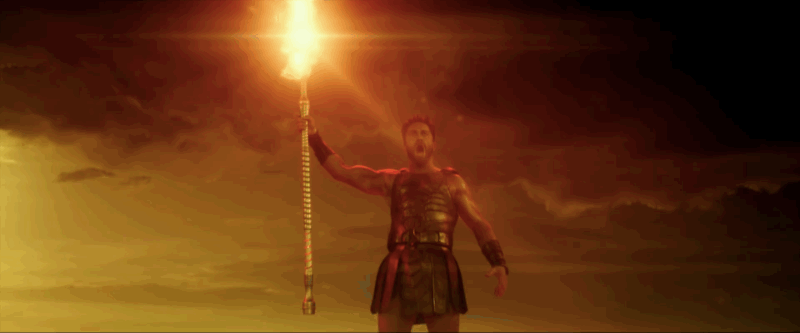
That said, there are a handful of incredibly beautiful images, that leave you with a sense of just why anybody thought this film was a good idea at all. At one point, when we first visit the spaceship belonging to Geoffrey Rush’s Ra, there’s a stunning visual of the flat Earth that Ra is sailing over. A few bits inside the land of the dead are also just gorgeous. You can sort of see how someone might have seen a few of those renders, early on, and thought this might be a distinctive, even eye-popping, film.
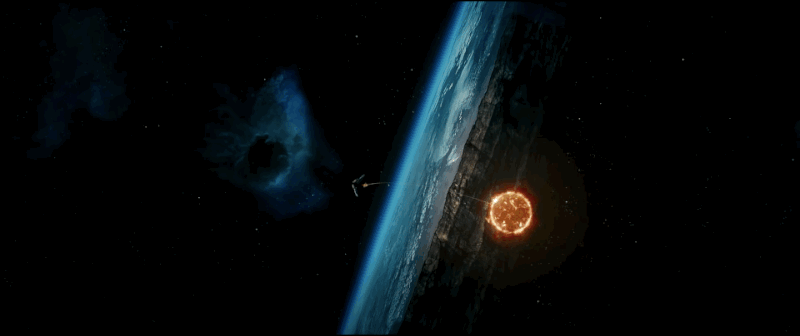
But for the most part, Gods of Egypt feels like such an abdication of story, and such a bastardisation of culture, that the only sane response is to abandon sanity and enlist in the murder-police of the senseless new era. As I write this from atop my pelvic cathedra in a world of unspeakable mayhem, I testify that Gods of Egypt has liberated us all.
You do not need to see this movie to know that you live in the world it created. Mercy is a cast-off from the time before the coming of Gods of Egypt.
